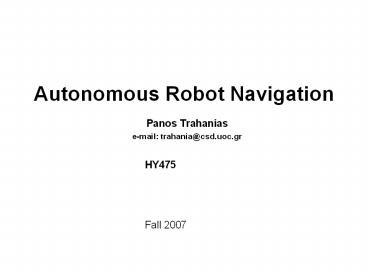Autonomous Robot Navigation - PowerPoint PPT Presentation
Title:
Autonomous Robot Navigation
Description:
The Mars rover Sojourner. The museum tour-guide Minerva. The RHex Hexapod ... Localization (where am I?) Mapping, simultaneous localization and mapping SLAM ... – PowerPoint PPT presentation
Number of Views:1826
Avg rating:3.0/5.0
Title: Autonomous Robot Navigation
1
Autonomous Robot Navigation
- Panos Trahanias
- e-mail trahania_at_csd.uoc.gr
??475 Fall 2007
2
Mobile Robots - Examples
The museum tour-guide Minerva
The Mars rover Sojourner
The museum tour-guide Lefkos
The RHex Hexapod
3
Typical Mobile Robot Setup
Sensors Stereo vision Sonars Bump
sensors Infrared sensors Laser scanner Bump
sensors Sonars Odometry
Interaction Processing Power Motors
Communications
4
Scope of the Course
- Mobile Robots How to move and achieve motion
target goals in (indoor) environments - Hence
- Localization (where am I?)
- Mapping, simultaneous localization and mapping
SLAM (what is my workspace?) - Path planning (how to get there?)
- Obstacle avoidance ( get there safely)
5
Autonomous Navigation- Research Directions
- Given
- An environment representation - Map
- Knowledge of current position C
- Target position G
- A path has to be planned and tracked that will
take the robot from C to G
6
Autonomous Navigation- Research Directions
- During execution (run-time)
- Objects / Obstacles O may block the robot
- The planned path is no-longer valid
X
- The obstacle needs to be avoided and the path may
need to be re-planned
7
Navigation Issues
- Important questions (Levitt et al 91)
- Important navigation issues
Where am I
Robot localization
Where are other places relative to me
Map building
How do I get to other places from here
Path/motion planning
8
Navigation Issues Underlying HW
Sensors Stereo vision Sonars Bump
sensors Infrared sensors Laser scanner Bump
sensors Sonars Odometry
Interaction Processing Power Motors
Communications
Laser Scanner
9
Range Sensor Model
- Laser Rangefinder
- Model range and angle errors.
10
Need for Modeling
Robot
Environment
Need for Appropriate Modeling
Extremely Complex Dynamical System
11
Markov Assumption
- State depends only on previous state and
observations - Static world assumption
- Hidden Markov Model (HMM)
Bayesian estimation Attempt to construct the
posterior distribution of the state given all
measurements
12
A Dynamic System
- Most commonly - Available
- Initial State
- Observations
- System (motion) Model
- Measurement (observation) Model
13
Inference - Learning
- Localization (inference task)Compute the
probability that the robot is at pose z at time t
given all observations up to time t (forward
recursions only)
- Map building (learning task)Determine the map m
that maximizes the probability of the observation
sequence.
14
Belief State
How is the prior distribution represented?
How is the posterior distribution calculated?
- Discrete representation
- Grid (Dynamic) (Dynamic) Markov localization
(Burgard98) - Samples Monte Carlo localization (Fox99)
- Continuous representation
- Gaussian distributions Kalman filters (Kalman60)
15
Example State Representations for Robot
Localization
Discrete Representations
Continuous Representations
Grid Based approaches (Markov localization)
Particle Filters (Monte Carlolocalization)
Kalman Tracking
16
- LOCALIZATION
17
Markov Assumption
- Localization determine the likelihood of robots
state
Given a sequence of observations
Determine the probability
18
Markov Assumption
- In practice too difficult to determine the joint
effect of all observations up to time K. - Common assumption hidden states obey the Markov
assumption (static world assumption), so as we
can factor as
19
Markov Assumption
20
Markov Assumption
Integrate over all possible states
- All information about past history is represented
in
Different approaches in this representation lead
to different treatments of the problem.
21
Kalman Filtering
- Probabilistic estimation
- Simultaneously maintain estimates for both the
state x and error covariance matrix P - Equivalent to say output of a Kalman filter is a
Gaussian PDF (other methods can handle more
general distributions)
22
Kalman Filtering
Crude localization method integrate robot
velocity commands
Problem info continuously lost, no new info
added. Solution add info from exterioreceptive
sensors.
23
Kalman Filtering
Sensor measurements add new info PDF in sensor
space. Localization knowledge (prior to sensor
measurement) is a PDF in state space. Probabilist
ic Estimation merge the 2 PDFs
Two step process prediction update
24
Kalman Filtering
Simple observer update
25
Kalman Filtering
Prediction
Update
26
Kalman Filtering
Observing with probability distributions
27
Kalman Filtering
Prediction
Update
where
28
Kalman Filtering
29
Kalman Filtering
30
Kalman Filtering
31
Kalman Filtering
32
Bayesian Methods
33
Bayesian Methods Discrete Approximations
34
Bayesian Methods Discrete Approximations
35
Bayesian Methods Discrete Approximations
Results
36
Bayesian Methods Discrete Approximations
Results
37
Bayesian Methods Particle Filters
38
Bayesian Methods Particle Filters/Resampling
39
Bayesian Methods Particle Filters
Motion Model
40
Bayesian Methods Particle Filters
State Belief
41
Bayesian Methods Particle Filters
Global Localization
42
Bayesian Methods Particle Filters
Global Localization - Results
43
Bayesian Methods Sensor Models
Typical Sonar Scan
44
Bayesian Methods Sensor Models
Histograms
45
- PATH PLANNING
46
Bug Algorithms
Bug1
47
Bug Algorithms
Bug1
48
Bug Algorithms
Bug2
49
Bug Algorithms
Bug2
50
Bug Algorithms
Bug2
51
- POTENTIAL FUNCTIONS
52
Potential Field
Attractive Repulsive Forces
53
Potential Field
Potential Function
54
Potential Field
Attractive Potential
55
Potential Field
Repulsive Potential
56
Potential Field
BrushFire Algorithm
57
Potential Field
Local Minima Problem
58
Potential Field
Wavefront Planner
59
Navigation Functions
60
Navigation Functions
61
Value Iteration
- Value Iteration Algorithm
- Dynamic programming (fast)
- Creates potential field (run only once per
target) - Initialization rule
- Update rule
62
Value Iteration - Results
63
- OBSTACLE AVOIDANCE
64
Certainty Grid Representation
65
VFF Virtual Force Field
66
VFF Virtual Force Field
67
Polar Histogram
68
Polar Histogram
69
Motion Candidate Directions
70
Traveling Alongside an Obstacle
71
Steering Reference
72
VFH Example Course
73
- CONFIGURATION SPACE
74
Two-link Manipulator - Workspace
75
Two-link Manipulator Configuration Space
76
Obstacles Configuration Space
77
Obstacles Configuration Space
78
Obstacles Configuration Space
79
Obstacles Configuration Space
80
Workspace Configuration Space
81
Workspace Configuration Space
82
Workspace Configuration Space
83
Planar Parallel Mechanism































